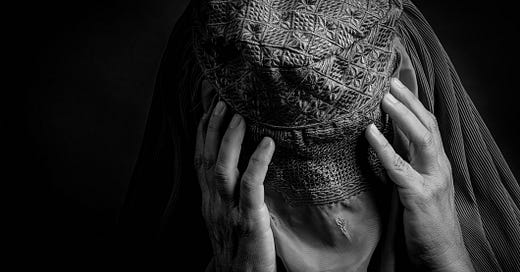How we exited Afghanistan was terrible. There were many people, particularly women, who we relied upon while there and then abandoned to almost certain mistreatment or even death at the hands of the Taliban once we left. But even bigger than the issue of how we left was how we had stayed. We were in Afghanistan for 20 years, spending $2Billion and spilling the blood of men, women and children - 2,324 U.S. military personnel and 1,144 allied troops, in addition to over seventy thousand Afghans. Yet by the end of the war, America’s presence had become only slightly less abhorrent to most Afghans than was the Taliban. We fought a war in Afghanistan, but we did not create peace.
It is the women who now suffer most.
I had first heard about the plight of women under the Taliban in the 1990’s, when Jay Lenos’ wife Mavis was Chair of the Feminist Majority Foundation's Campaign for Afghan Women and Girls. When 9/11 happened and the United States made its subsequent entrance into Afghanistan, many Americans were already aware of the Taliban and its cruelty to women.
Now, not only is the Taliban back in power, but despite their promises to the contrary there’s nothing “new Taliban” about them. They are as cruel and oppressive toward women as they were before, only tightening their grip rather than loosening it in any way. Woman and girls there cannot go to school, they cannot work outside the home or travel anywhere beyond 45 miles without a male relative, they are denied healthcare, they cannot be seen in public without thick full covering even over their faces, and they cannot sing or read aloud in public. Gender apartheid doesn’t even begin to cover it. Women don’t have fewer rights in Afghanistan; they have no rights at all.
In addition to that, there are renewed indications that the Taliban is now harboring Al Qaeda and other international terrorist organizations that we had originally gone there to eliminate! And with their new “virtue and vice” order, the Taliban has actually increased its systemic mental, emotional and physical abuse of women. The tragedy is incalculable. The sense of helplessness that comes from reading about what is happening there, like the suffering in Gaza and elsewhere, is tormenting. But unlike situations where we feel a change in U.S. policy could possibly make a difference, clearly the United States already went to war in Afghanistan - and we spectacularly failed.
Now, in a very real way, we are back to where we started.
For those of you who don’t remember, here’s just a little bit of background: when the U.S. first entered Afghanistan, going there to rout out Al Qaeda seemed a legitimate reaction to 9/11. The problems began when we unwisely diverted our resources away from Afghanistan, to a place that had nothing at all to do with 9/11: Iraq! Going back even further, there’s great background information about Afghanistan in Charlie Wilson’s War, a classic film directed by the late great Mike Nichols and starring Phillip Seymour Hoffman.
There is at this point very little any of us can do to help the women of Afghanistan. But one thing we can do is try to understand. Those who do not learn history are doomed to repeat it, and never has a truism been relevant than is that one to America’s military misadventures over the last sixty years. Understanding better the tragic mistakes of our past, we are more prepared to avert them in the future.
Back when we originally exited Afghanistan in 2021, I did several interviews and articles that I think are good to revisit now. They are listed below…
THE WAR IN AFGHANISTAN: An Effort to More Deeply Understand
What Really Happened in Afghanistan? The Wisdom of Sarah Chayes
Radio Kabul: Tom Freston's Memories of Afghan Culture
What Happens in Afghanistan Now? Post-war reflections with Obaidullah Baheer
A Veteran's Perspective: My conversation with Laura Jedeed
God bless us all. May the suffering cease. May a miracle occur.





Thank you Marianne for allowing a deeper more meaningful conversation- Cat Parenti , author of Afghanistan a Memoir from Brooklyn to Kabul, and her daughter Chandra Khan began AWE over two years ago- The Afghan Women’s Empowerment project- getting the work they can do - embroidery at home- so they can eat more than bread and water. The atrocities are real and we can face them with the wisdom of ages and a fierce commitment filled with true compassion. Www.grandmachandra.com or Cat.Parenti@gmail.com to give real assistance by purchasing these women’s work
Hay una frase que entiendo, puede aplicarse a este relato de Marianne: "Ser mujer en el primer mundo es difícil, pero serlo en el resto del mundo es heroico".
El texto publicado por Marianne nos invita a reflexionar seriamente respecto al "lugar" de las mujeres en todas las culturas, aunque en algunas, la invisibilidad es absoluta.
Saludos respetuosos!